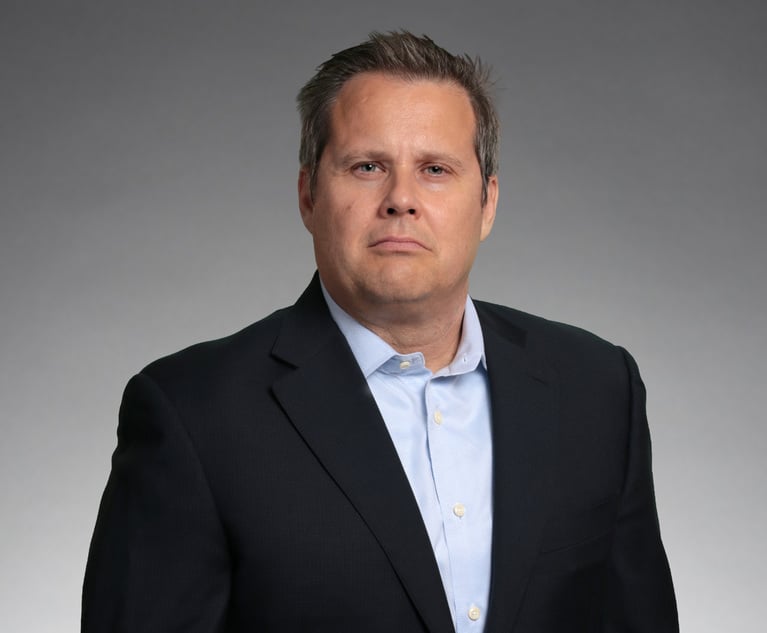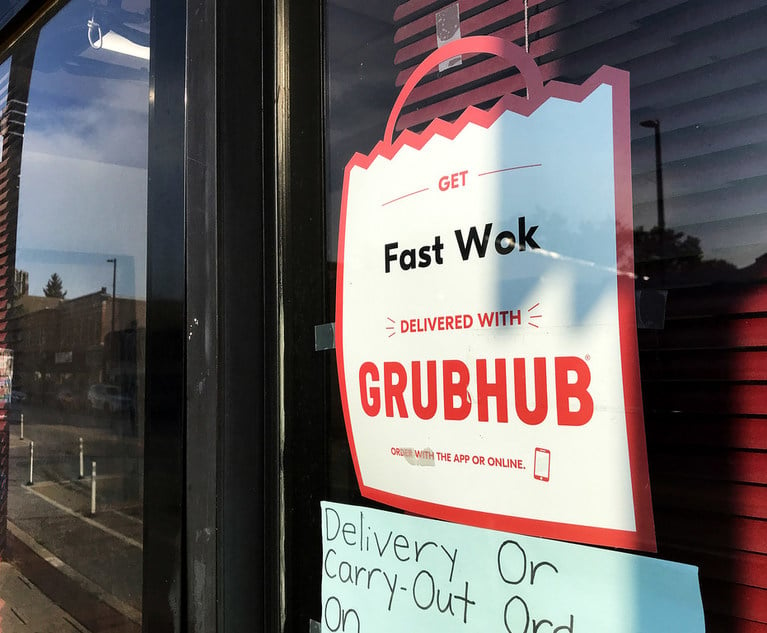 Judge William Alsup, U.S. District Court for the Northern District of California.
Judge William Alsup, U.S. District Court for the Northern District of California.'Their Day in Arbitration': Judge Compels Mass Arbitration Against DoorDash
Judge William Alsup wrote "in irony upon irony, DoorDash now wishes to resort to a class-wide lawsuit, the very device it denied to the workers, to avoid its duty to arbitrate. This hypocrisy will not be blessed, at least by this order."
February 10, 2020 at 07:24 PM
5 minute read
This story was updated at 7:05 p.m. Pacific Time on Feb. 10 after the ruling.
A federal judge compelled arbitration in cases brought by more than 5,000 individual couriers who allege third-party delivery company DoorDash misclassifies them as contractors.
U.S. District Judge William Alsup of the Northern District of California issued an order Monday shortly after hearing arguments on plaintiffs' amended motion to compel arbitration and DoorDash's motion to stay the case as it pursues a proposed state court class action settlement over similar claims. The judge in the same order also denied the company's stay motion.
"I don't want to grant a stay over a settlement that's going nowhere in state court," said Alsup at Monday's hearing.
Plaintiffs firm Keller Lenkner is representing the contractors in the mass arbitration against DoorDash, claiming the company and its Gibson, Dunn & Crutcher attorneys are trying to "wiggle out" of the arbitration agreements it forced on the couriers.
On Nov. 26, Alsup ordered Keller Lenkner to submit sworn declarations from all petitioners with their name, identifying information they used to sign up for DoorDash, the dates of service and a reference to the specific arbitration agreement they clicked through.
During the hearing, Gibson Dunn's Joshua Lipshutz raised concerns that hundreds of the individual plaintiffs in the case are not legitimate. For starters, he said, the firm did not secure declarations for 869 of the petitioners. For the petitioners without declarations, Alsup told Warren Postman of Keller Lenkner, "You'll lose on those."
Lipshutz also said none of the plaintiffs' declarations included handwritten signatures, and when the firm asked for proof that petitioners approved the declarations, Keller Lenkner returned DocuSign Certificates of Completion for 400 of the 5,879 plaintiffs.
In DoorDash's opposition to the amended motion to compel, the company's attorneys said there were "anomalies" with the certificates, including that the documents don't mention Keller Lenkner and instead refer to solo practitioner Jeremy Troxel with an address in "Washtington, DC [sic]" as the envelope originator. Unable to find the website for Troxel's firm, the company's lawyers referred to his LinkedIn, where he appears to be licensed in New York, not the nation's capital.
Alsup said that if Gibson Dunn could prove forgery or other potential procedural screw-ups, he would order Keller Lenkner of Chicago to pay DoorDash's attorney fees but that wasn't a basis to deny the claims of thousands of petitioners.
"Out of that 6,000, I do believe there are some that [plaintiffs attorneys] tried to pull the wool over my eyes," the judge said. "But I'm not going to hold up that relief for the vast majority of people that I believe are legitimate."
After Lipshutz pushed back on Alsup's assertion that there might only be a dozen illegitimate plaintiffs, the judge responded by saying, "Let's say there's 100, and you won't give the rest of them their day in arbitration. It's too late to say day in court, because you took that away from them. You want a stay forever; I know how this works."
In Monday's order, Alsup ordered 5,010 individual cases to proceed in arbitration, denying the motion to compel for the 869 petitions without declarations.
The judge also denied petitioners' motion to seal certain documents related to DoorDash's new arbitration venue, the International Institute for Conflict Prevention and Resolution (CPR). The company switched to the new ADR provider in an updated click-through user agreement one day after the American Arbitration Association closed out thousands of its cases for failure to pay filing fees.
Keller Lenkner has alleged that Gibson Dunn has worked with CPR to form new guidelines around mass arbitration that include setting 10 test cases that serve as bellwethers when employers face similar claims from 30 or more individuals. Gibson Dunn admitted to providing suggestions for the draft protocols but has denied anything "nefarious" took place.
Alsup said he is denying the motion to seal, because it's in the public interest for Gibson Dunn and CPR to "lay bare to the world at large" if the dispute resolution organization that claims to be neutral is "actually being guided by an employer-side firm."
At the end of the hearing, Alsup said he gave plaintiffs "a road map to victory" but that "Gibson Dunn raises plausible arguments that there might be some shenanigans" going on with the e-signatures.
If Gibson Dunn did find evidence of such shenanigans, he told Postman, "Your firm should pay their firm's bills for that."
"We are confident in the process and that there were no shenanigans," Postman said.
In the ruling, Alsup said the case ironically exemplifies the remnants of procedural rights allotted to many workers. "For decades, the employer-side bar and their employer clients have forced arbitration clauses upon workers, thus taking away their right to go to court, and forced class-action waivers upon them too, thus taking away their ability to join collectively to vindicate common rights," he wrote.
Alsup said that DoorDash likely never expected so many workers would seek arbitration, as it now resists its side of the bargain.
"Instead, in irony upon irony, DoorDash now wishes to resort to a class-wide lawsuit, the very device it denied to the workers, to avoid its duty to arbitrate," he wrote. "This hypocrisy will not be blessed, at least by this order."
This content has been archived. It is available through our partners, LexisNexis® and Bloomberg Law.
To view this content, please continue to their sites.
Not a Lexis Subscriber?
Subscribe Now
Not a Bloomberg Law Subscriber?
Subscribe Now
NOT FOR REPRINT
© 2024 ALM Global, LLC, All Rights Reserved. Request academic re-use from www.copyright.com. All other uses, submit a request to [email protected]. For more information visit Asset & Logo Licensing.
You Might Like
View All

Settlement Negotiations Taking Shape in Class Action Against Poppi Prebiotic Sodas
2 minute read
K&L Gates Secures $10.5M Verdict for Washington Meat Retailer in Lawsuit Over 'Boneless' Chicken Product

'Black Box': Food Delivery Platform GrubHub Hit With Class Action Targeting Its Use of TikTok Software
Law Firms Mentioned
Trending Stories
- 1Call for Nominations: Elite Trial Lawyers 2025
- 2Senate Judiciary Dems Release Report on Supreme Court Ethics
- 3Senate Confirms Last 2 of Biden's California Judicial Nominees
- 4Morrison & Foerster Doles Out Year-End and Special Bonuses, Raises Base Compensation for Associates
- 5Tom Girardi to Surrender to Federal Authorities on Jan. 7
Who Got The Work
Michael G. Bongiorno, Andrew Scott Dulberg and Elizabeth E. Driscoll from Wilmer Cutler Pickering Hale and Dorr have stepped in to represent Symbotic Inc., an A.I.-enabled technology platform that focuses on increasing supply chain efficiency, and other defendants in a pending shareholder derivative lawsuit. The case, filed Oct. 2 in Massachusetts District Court by the Brown Law Firm on behalf of Stephen Austen, accuses certain officers and directors of misleading investors in regard to Symbotic's potential for margin growth by failing to disclose that the company was not equipped to timely deploy its systems or manage expenses through project delays. The case, assigned to U.S. District Judge Nathaniel M. Gorton, is 1:24-cv-12522, Austen v. Cohen et al.
Who Got The Work
Edmund Polubinski and Marie Killmond of Davis Polk & Wardwell have entered appearances for data platform software development company MongoDB and other defendants in a pending shareholder derivative lawsuit. The action, filed Oct. 7 in New York Southern District Court by the Brown Law Firm, accuses the company's directors and/or officers of falsely expressing confidence in the company’s restructuring of its sales incentive plan and downplaying the severity of decreases in its upfront commitments. The case is 1:24-cv-07594, Roy v. Ittycheria et al.
Who Got The Work
Amy O. Bruchs and Kurt F. Ellison of Michael Best & Friedrich have entered appearances for Epic Systems Corp. in a pending employment discrimination lawsuit. The suit was filed Sept. 7 in Wisconsin Western District Court by Levine Eisberner LLC and Siri & Glimstad on behalf of a project manager who claims that he was wrongfully terminated after applying for a religious exemption to the defendant's COVID-19 vaccine mandate. The case, assigned to U.S. Magistrate Judge Anita Marie Boor, is 3:24-cv-00630, Secker, Nathan v. Epic Systems Corporation.
Who Got The Work
David X. Sullivan, Thomas J. Finn and Gregory A. Hall from McCarter & English have entered appearances for Sunrun Installation Services in a pending civil rights lawsuit. The complaint was filed Sept. 4 in Connecticut District Court by attorney Robert M. Berke on behalf of former employee George Edward Steins, who was arrested and charged with employing an unregistered home improvement salesperson. The complaint alleges that had Sunrun informed the Connecticut Department of Consumer Protection that the plaintiff's employment had ended in 2017 and that he no longer held Sunrun's home improvement contractor license, he would not have been hit with charges, which were dismissed in May 2024. The case, assigned to U.S. District Judge Jeffrey A. Meyer, is 3:24-cv-01423, Steins v. Sunrun, Inc. et al.
Who Got The Work
Greenberg Traurig shareholder Joshua L. Raskin has entered an appearance for boohoo.com UK Ltd. in a pending patent infringement lawsuit. The suit, filed Sept. 3 in Texas Eastern District Court by Rozier Hardt McDonough on behalf of Alto Dynamics, asserts five patents related to an online shopping platform. The case, assigned to U.S. District Judge Rodney Gilstrap, is 2:24-cv-00719, Alto Dynamics, LLC v. boohoo.com UK Limited.
Featured Firms
Law Offices of Gary Martin Hays & Associates, P.C.
(470) 294-1674
Law Offices of Mark E. Salomone
(857) 444-6468
Smith & Hassler
(713) 739-1250






